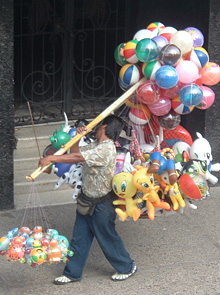 |
 |
 |
 Business News | August 2007 Business News | August 2007  
Mexico Tries to Reform Street Economics
 Aul Kiernan - Associated Press Aul Kiernan - Associated Press
go to original


| | Previous eviction plans have only succeeded briefly, as vendors promptly swarmed back to the downtown area after relocation sites proved fruitless.
|
Mexico City - Tens of thousands of vendors sell everything from school supplies to pirated pornography videos on the teeming streets radiating from Mexico City's main plaza, the Zocalo.

Mexico City's leftist mayor, working from a building all but engulfed by the makeshift market, is now seeking to move the vendors from the capital's historic downtown by Oct. 12 and free up streets lined with colonial treasures ranging from cathedrals to museums.

If Mayor Marcelo Ebrard succeeds in his plan to relocate the vendors to government-subsidized properties nearby, he will have done what many other administrations have failed to do. Attempts in other neighborhoods have sparked all-out street battles with police.

Removing the vendors is one of the few issues the capital's leftist government has in common with President Felipe Calderon's conservative administration, which views them as tax evaders it wants to reel into the formal workplace.

But relocating them promises to be difficult.

The vendors are represented by large and occasionally violent unions, and are campaigning against the relocation plan. They argue that the designated properties offered by the city will fail to attract customers and have asked for the deadline to be extended until Jan. 7.

"The people can't support themselves on some property if there are no sales," said Alejandra Barrios, president of a high-profile vendors union recently at a conference of city and business leaders. "And the new areas need to develop a reputation, and that takes time."

"We have to defend ourselves somehow, and Marcelo (Ebrard) has to understand that."

The Mexico City Chamber of Commerce estimates there are 35,000 vendors in the downtown area.

Vendors say they can often make more money selling in street stalls than they can earn with jobs in the formal sector, where the minimum wage is just $5 a day.

Ebrard says he does not want to use force to meet his goal of eradicating the huge market, and he is trying to negotiate a deal with business leaders and vendors. But the market provides thousands of jobs for the vendors, who pay no taxes and receive few social services.

Previous eviction plans have only succeeded briefly, as vendors promptly swarmed back to the downtown area after relocation sites proved fruitless.

The city's campaign comes as Calderon, as well, grapples with an underground economy that the World Bank estimates employs as much as 60 percent of Mexico's work force and equals nearly 30 percent of the country's gross domestic product.

"The country can not prosper on a base of illegality, and the greater the illegal economy, the more society will suffer and fall victim to crime," Calderon said recently.

So far, Calderon says his government has created 500,000 new jobs and has set aside $300 million to cover the social security for first-time job holders for one year, an effort to encourage people to join the formal work force. He has called on his Cabinet to encourage small and medium businesses.

Mexico's notoriously low tax revenues are part of the reason that its social protection programs are too weak to discourage informal labor, said Bill Maloney, chief economist for Latin America and the Caribbean at the World Bank.

Poor workers often drift in and out of the formal job market, sometimes earning more selling designer sneakers on the street than working as an accountant.

"This is a status rise, going from being a salaried employee somewhere to being informal, self-employed," Maloney said.

Victor Gutierrez, a 48-year-old father of two who is blind, said he began selling goods in the streets after the 1994 peso devaluation.

"In a company, unfortunately, it's rare for them to pay even a little bit more than the minimum wage," he said.

Gutierrez said he made about $3 a day working at the textile plant. Now, he can earn as much as $20 a day selling board games and beauty products on the street.

But Gutierrez said if the city government moves him to a government-sanctioned location, business will likely suffer since his stand will no longer be in the line of daily foot traffic.

Many vendors, he added, will then simply join the millions of Mexicans who have migrated illegally to the United States in search of work. | 
 | |
 |



